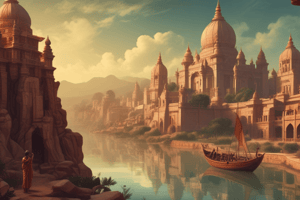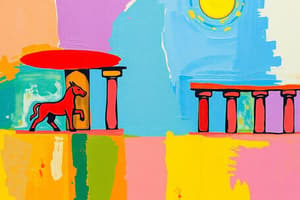Podcast
Questions and Answers
Who is credited with establishing the Mauryan Empire?
Who is credited with establishing the Mauryan Empire?
- Chandragupta Maurya (correct)
- Ashoka
- Babur
- Chandra Gupta II
What was introduced by the Aryans when they moved into India?
What was introduced by the Aryans when they moved into India?
- Sanskrit, the Varna system, and iron weapons (correct)
- The Vedic Society
- The Indus Valley Civilization
- The Gupta Empire
Who led the Indian independence movement using non-violent protests and civil disobedience?
Who led the Indian independence movement using non-violent protests and civil disobedience?
- Mohandas Gandhi (correct)
- Akbar
- Chandragupta Maurya
- Ashoka
What was the name of the civilization that developed along the Indus River?
What was the name of the civilization that developed along the Indus River?
Who commissioned the building of the Taj Mahal?
Who commissioned the building of the Taj Mahal?
What was the name of the society established by the Aryans?
What was the name of the society established by the Aryans?
Who was intolerant of other religions?
Who was intolerant of other religions?
Who founded the Gupta Empire?
Who founded the Gupta Empire?
Which ancient Indian empire was founded by Chandragupta Maurya?
Which ancient Indian empire was founded by Chandragupta Maurya?
Who is credited with expanding China's territory and promoting Confucianism?
Who is credited with expanding China's territory and promoting Confucianism?
Which dynasty is often referred to as a 'golden age' in Chinese history?
Which dynasty is often referred to as a 'golden age' in Chinese history?
Who founded the Mongol Empire and created the largest empire in history?
Who founded the Mongol Empire and created the largest empire in history?
Who is credited with introducing Europeans to Chinese technology and culture?
Who is credited with introducing Europeans to Chinese technology and culture?
Who was the leader of the nationalist (democratic) movement in China?
Who was the leader of the nationalist (democratic) movement in China?
Who was the founding father of the People's Republic of China?
Who was the founding father of the People's Republic of China?
Who is credited with deviating from Maoist Communist policies in favor of more capitalist economic policies?
Who is credited with deviating from Maoist Communist policies in favor of more capitalist economic policies?
Flashcards are hidden until you start studying
Study Notes
Important People in the India Unit
- Aryans introduced Sanskrit, Varna system, unified Hinduism, used cows as currency, and utilized iron weapons and chariots in India around 2000 BC.
- Siddhartha Gautama, a Hindu prince, became the Buddha, discovering the cause of suffering and developing Buddhism's core teachings.
- Chandragupta Maurya founded the Mauryan Empire in the 320s BC, establishing a thriving government and economy.
- Ashoka, Chandragupta Maurya's grandson, converted to Buddhism, promoting non-violence and religious tolerance.
- Chandra Gupta I founded the Gupta Empire, unifying smaller states and promoting religious tolerance.
- Chandra Gupta II led the Gupta Empire during its "Golden Age," fostering advancements in science, technology, and promoting Hinduism.
- Babur founded the Mughal Empire, uniting split kingdoms but was intolerant of other religions.
- Akbar strengthened the Mughal Empire, adopting a policy of religious tolerance and cultural achievements.
- Shah Jahan commissioned the Taj Mahal in memory of his wife Mumtaz Mahal.
- Mohandas Gandhi led the Indian independence movement, advocating for civil disobedience, non-violent protests, and economic self-sufficiency, leading to India's independence from British rule in 1947.
Important Civilizations/Entities in the India Unit
- Indus Valley Civilization (Harappan Civilization) developed along the Indus River, notable for urban planning, architecture, and sophisticated sewage systems.
- Vedic Society was established by the Aryans, marked by the introduction of Sanskrit and the development of Hinduism and the Varna system.
- Mauryan Empire was founded by Chandragupta Maurya, notable for its strong centralized government and the spread of Buddhism under Ashoka.
- Gupta Empire was founded by Chandra Gupta I, experiencing a "Golden Age" of Indian culture, science, and technology under Chandra Gupta II.
- Mughal Empire was founded by Babur, expanded and culturally enriched under Akbar, and renowned for architectural achievements like the Taj Mahal.
- British East India Company established control over large parts of India in the 1600s, later functioning under increasing British government oversight.
- British India was a period of direct rule by the British government following the Sepoy Rebellion, leading to significant infrastructural development and exploitation until India's independence in 1947.
Important People in the China Unit
- Shi-Huang Di, the First Emperor of the Qin Dynasty, established a strong centralized government and standardized various aspects of Chinese society.
- Liu Bang, Founder of the Han Dynasty, led China into a period often referred to as a "golden age."
- Wudi, Emperor of the Han Dynasty, expanded China's territory and promoted Confucianism as the main government philosophy.
- Genghis Khan, Founder of the Mongol Empire, was known for his military conquests and creation of the largest empire in history.
- Marco Polo, a Venetian explorer, visited China during the Yuan Dynasty, documented his travels, and introduced Europeans to Chinese technology and culture.
- Mao Zedong, Founding father of the People's Republic of China, led the Chinese Communist Party (CCP) and established Communist rule in China.
- Chiang Kai-Shek, Leader of the nationalist (democratic) movement in China, opposed the CCP during the Chinese Civil War.
- Deng Xiaoping, a Chinese politician and reformer, deviated from Maoist Communist policies in favor of more capitalist economic policies, leading to immense economic growth in China.
Studying That Suits You
Use AI to generate personalized quizzes and flashcards to suit your learning preferences.




